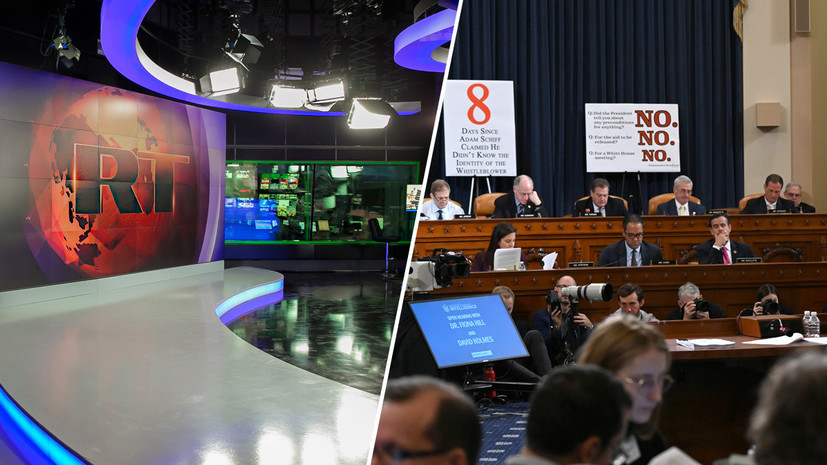RT was discussed during a public hearing in Congress on the impeachment of US President Donald Trump. The panelists called the channel a “propaganda machine” during the testimony of one of the witnesses.
This happened during a speech by Fiona Hill, a former special assistant to the president and senior director for European and Russian affairs at the office of the US National Security Council. She held this post from April 2017 to August this year.
- RT was mentioned during a public hearing about the impeachment of US President Donald Trump in Congress
RT was mentioned in a conversation with Hill by Republican Congressman Mike Conway, who had previously led an investigation into Russia's “interference” in the 2016 US presidential election. Recall that the official result of this work was the conclusion that there was no collusion between Trump and the Russian side.
Congressman began by asking Hill if she agreed with the statement that “RT is a propaganda machine operating in the United States.” The former Trump administration spokeswoman said yes, and Conway continued to question the witness.
“Is it permissible for RT to be used as a tool to influence the politics of another country?” The congressman asked.
Conway talked about some RT materials on shale oil production using the fracking method, in which, in his opinion, this method is criticized. As a result, the congressman classified these plots as "an attempt to influence US public policy." “Is that permissible?” Or should the Americans pay attention to this? ”Conway asked.
Hill noted that "American citizens should pay attention to RT and other news resources used to promote this kind of information."
Ex-adviser to Trump also said that in 2011 she allegedly personally heard how Putin assessed the production of shale oil in the United States. According to Hill, the Russian leader “clearly defined the position,” according to which fracking technology supposedly threatens Russian interests in the oil industry.
“So, the Americans are watching RT, and all the misinformation and propaganda that feed them on this channel is clearly not in America’s interests,” Conway concluded.
Recall that the process on the impeachment of Trump began on September 24. A formal reason was the complaint of an unknown scammer. The statement said that Trump allegedly abused power and tried to put pressure on President of Ukraine Volodymyr Zelensky to launch an investigation into the son of political opponent Trump, US presidential candidate Joe Biden.
On the same day, the head of the White House published a transcript of his telephone conversation with Zelensky.
As part of the impeachment procedure, closed hearings were held with the participation of a number of officials from the White House and the State Department. Later, the public phase began, during which congressional hearings began to be openly broadcast on television.
"Influence platform"
In the USA, the RT channel is systematically mentioned as a threat to the US information policy in its most diverse aspects.
For example, in 2017, Democrat Gene Shahin advocated tightening restrictions on foreign agents in the United States. Building her line of argument, she stated that there was “undeniable evidence” of the influence of the Russian authorities on the editorial policy of RT.
During the congressional hearings, she showed off an allegedly secret photograph of Vladimir Putin and RT editor-in-chief Margarita Simonyan. Based on this picture, the politician concluded that the channel is being curated directly from the Kremlin. It is noteworthy that the photo was taken at the event in honor of the decade of RT and was in the public domain.
- Democrat Gene Shahin shows a “declassified” photo of Margarita Simonyan with Vladimir Putin
In October 2019, the U.S. Senate Intelligence Committee issued another report on Russia's "interference" in the presidential election. The authors of the document mentioned “platforms of influence” of the Russian side, among which were RT and Sputnik.
“The most successful Russian operations combine hidden hacking and information dissemination operations, operations on social networks, as well as using fake accounts on more open influence platforms, such as state Internet resources, including RT and Sputnik,” the document said .
The Russian Foreign Ministry called the attitude to Russian media abroad censorship. According to the head of the department, Sergey Lavrov, journalists from Russia are artificially created difficult working conditions.
“Around the Russian media resources in many countries, an atmosphere of hostility, mistrust is escalating,” the minister said during a conference on media freedom in August.

